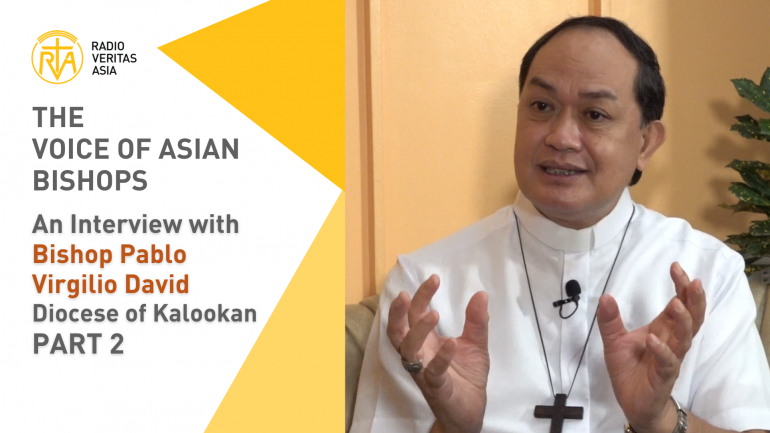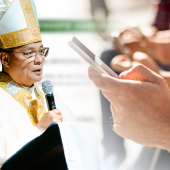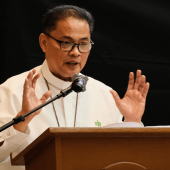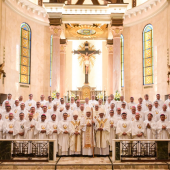Philippines President of Catholic Bishops says “Fiducia Supplicans” speaks for itself

On the possibility of blessings for couples in irregular situations and couples of the same sex, the president of the Catholic Bishops Conference of the Philippines (CBCP) said in a statement on Wednesday that “the document speaks for itself and therefore does not require much explanation.”
Pablo Virgilio David, also the Bishop of Kalookan, referred to the Declaration entitled “Fiducia Supplicans," which was released on December 18 by the Vatican Dicastery for the Doctrine of the Faith with the approval of Pope Francis.
“It is clear in its content and intent. Basically, it elaborates ‘On the Pastoral Meaning of Blessings’,” said David.
He cited paragraph 41 which says “What has been said in this Declaration regarding the blessings of same-sex couples is sufficient to guide the prudent and fatherly discernment of ordained ministers in this regard. Thus, beyond the guidance provided above, no further responses should be expected about possible ways to regulate details or practicalities regarding blessings of this type.”
Speaking for the CBCP, David gave the link to the document for those interested to know and understand what the document itself is saying https://www.vatican.va/.../rc_ddf_doc_20231218_fiducia...
He described the document with an introduction where the Prefect of the said dicastery, Victor Manuel Cardinal Fernandez pointed out that “this declaration remains firm on the traditional doctrine of the Church about marriage, not allowing any type of liturgical rite or blessing similar to a liturgical rite that can create confusion.”
What Cardinal Fernandez considers as unique value of this document is that “…it offers a specific and innovative contribution to the pastoral meaning of blessings, permitting a broadening and enrichment of the classical understanding of blessings…”, said David.
David highlighted five paragraphs—namely 13, 25, 31, 38, and 39–in the document:
“…Pope Francis urged us not to close pastoral charity, which should permeate all our decisions and attitudes, and to avoid being judges who only deny, reject, and exclude. Let us then respond to the Holy Father’s proposal by developing a broader understanding of blessings.” (FS13)
“…when people ask for a blessing, an exhaustive moral analysis should not be placed as a precondition for conferring it. For, those seeking a blessing should not be required to have prior moral perfection.” (FS25)
“Within the horizon outlined here appears the possibility of blessings for couples in irregular situations and for couples of the same sex, the form of which should not be fixed ritually by ecclesial authorities to avoid producing confusion with the blessing proper to the Sacrament of Marriage. In such cases, a blessing may be imparted… upon those who, recognizing themselves to be destitute and in need of his help, do not claim a legitimation of their own status, but who beg that all that is true, good, and humanly valid in their lives and their relationships be enriched, healed, and elevated by the presence of the Holy Spirit.”(FS31)
“For this reason, one should neither provide for nor promote a ritual for the blessings of couples in an irregular situation. At the same time, one should not prevent or prohibit the Church’s closeness to people in every situation in which they might seek God’s help through a simple blessing.” (FS38)
“…precisely to avoid any form of confusion or scandal, when the prayer of blessing is requested by a couple in an irregular situation… the blessing should never be imparted in concurrence with the ceremonies of a civil union, and not even in connection with them. Nor can it be performed with any clothing, gestures, or words that are proper to a wedding. The same applies when the blessing is requested by a same-sex couple.” (FS 39)
David said the advisory was issued for the information of the Roman Catholic faithful in the Philippines. (MTV)
Radio Veritas Asia (RVA), a media platform of the Catholic Church, aims to share Christ. RVA started in 1969 as a continental Catholic radio station to serve Asian countries in their respective local language, thus earning the tag “the Voice of Asian Christianity.” Responding to the emerging context, RVA embraced media platforms to connect with the global Asian audience via its 21 language websites and various social media platforms.














